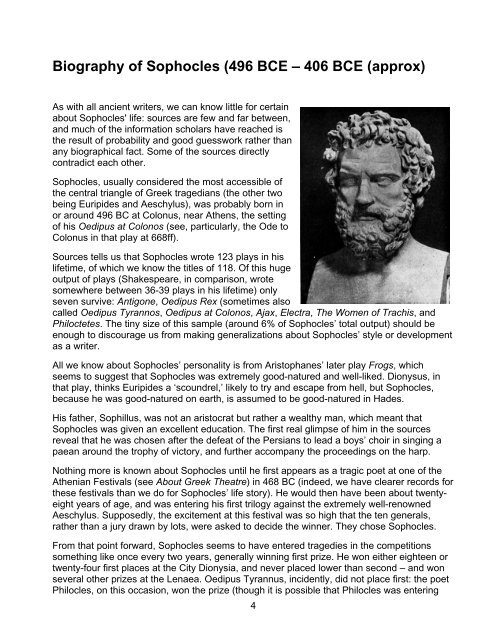Basic Information .3 - Muskegon Community College
Basic Information .3 - Muskegon Community College
Basic Information .3 - Muskegon Community College
You also want an ePaper? Increase the reach of your titles
YUMPU automatically turns print PDFs into web optimized ePapers that Google loves.
Biography of Sophocles (496 BCE – 406 BCE (approx)<br />
As with all ancient writers, we can know little for certain<br />
about Sophocles' life: sources are few and far between,<br />
and much of the information scholars have reached is<br />
the result of probability and good guesswork rather than<br />
any biographical fact. Some of the sources directly<br />
contradict each other.<br />
Sophocles, usually considered the most accessible of<br />
the central triangle of Greek tragedians (the other two<br />
being Euripides and Aeschylus), was probably born in<br />
or around 496 BC at Colonus, near Athens, the setting<br />
of his Oedipus at Colonos (see, particularly, the Ode to<br />
Colonus in that play at 668ff).<br />
Sources tells us that Sophocles wrote 123 plays in his<br />
lifetime, of which we know the titles of 118. Of this huge<br />
output of plays (Shakespeare, in comparison, wrote<br />
somewhere between 36-39 plays in his lifetime) only<br />
seven survive: Antigone, Oedipus Rex (sometimes also<br />
called Oedipus Tyrannos, Oedipus at Colonos, Ajax, Electra, The Women of Trachis, and<br />
Philoctetes. The tiny size of this sample (around 6% of Sophocles’ total output) should be<br />
enough to discourage us from making generalizations about Sophocles’ style or development<br />
as a writer.<br />
All we know about Sophocles’ personality is from Aristophanes’ later play Frogs, which<br />
seems to suggest that Sophocles was extremely good-natured and well-liked. Dionysus, in<br />
that play, thinks Euripides a ‘scoundrel,’ likely to try and escape from hell, but Sophocles,<br />
because he was good-natured on earth, is assumed to be good-natured in Hades.<br />
His father, Sophillus, was not an aristocrat but rather a wealthy man, which meant that<br />
Sophocles was given an excellent education. The first real glimpse of him in the sources<br />
reveal that he was chosen after the defeat of the Persians to lead a boys’ choir in singing a<br />
paean around the trophy of victory, and further accompany the proceedings on the harp.<br />
Nothing more is known about Sophocles until he first appears as a tragic poet at one of the<br />
Athenian Festivals (see About Greek Theatre) in 468 BC (indeed, we have clearer records for<br />
these festivals than we do for Sophocles’ life story). He would then have been about twentyeight<br />
years of age, and was entering his first trilogy against the extremely well-renowned<br />
Aeschylus. Supposedly, the excitement at this festival was so high that the ten generals,<br />
rather than a jury drawn by lots, were asked to decide the winner. They chose Sophocles.<br />
From that point forward, Sophocles seems to have entered tragedies in the competitions<br />
something like once every two years, generally winning first prize. He won either eighteen or<br />
twenty-four first places at the City Dionysia, and never placed lower than second – and won<br />
several other prizes at the Lenaea. Oedipus Tyrannus, incidently, did not place first: the poet<br />
Philocles, on this occasion, won the prize (though it is possible that Philocles was entering<br />
4
















